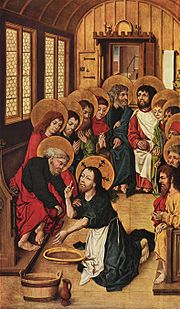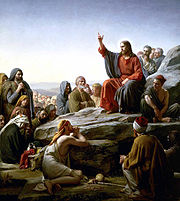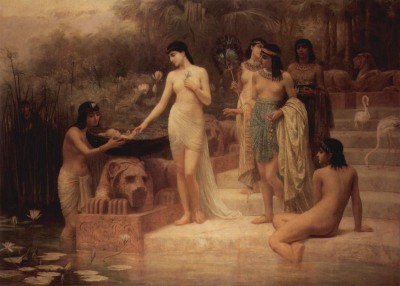Don’t Break the Chain
Ever in search of new experiences, I went to church on my own for the first time ever.
Church-going folk always seem delighted to welcome non-church-going folk. That pleasing fact makes me smile down deep inside. I sat discreetly in the most out-of-the-way spot I could find and was all alone until an older lady came and sat in the same pew. You tend to stand out when you don’t know the whole stand-up/sit-down ritual and my pew companion noticed the newcomer right away and tried to make me welcome.
She went and found me a copy of the missal so I could follow along with the reading and she made sure I always found the right hymn number. She nodded knowingly when I didn’t go up to receive communion but politely excused herself so that she could. More touching still, a friend, who I know only casually and rarely, spotted me and trekked the whole length of the church to exchange peace-be-with-yous.
My favourite bit of going to church is usually the bish’s sermon. The bish at the chapel we attended in New York put on a remarkably fine performance week after week and I always enjoyed his sermons immensely. But last night’s was poor. Even the readings seemed starkly shorn of significance given how important Maundy Thursday is to the Christian calendar. But what the occasion lacked in it profundity, it made up in ceremony.
I got to witness the foot-washing thing – another first for me. Perhaps because of the Judas and Mary song, I found the whole ceremony strangely intimate which, I guess, is the point. Even the unfamiliar parts of the ceremony are oddly familiar – like walking down Fifth Avenue for the first time and realizing you have been there a thousand times before. The only bit that seemed distinctly odd was the lap of the church that we did at the end. Not sure what that was about.
I have now been to the Catholic Church many, many more times than I have been to the church of my childhood but the Book of Common Prayer still seems familiar and the catholic liturgy foreign. I can now predict when they will “Bring forth the Holy Condiments” or whatever is in those little bottles but I still don’t know all the call-and-response bits or when I am supposed to be standing or sitting.
Ethical dilemmas abound. How can I be true to my own beliefs without causing offence? Which parts of the ceremony signify 2000 years of tradition and which signify a sacred vow that I’d rather not take lightly?
Singing hymns? Easy! I love hymns. I love singing. I sing.
I skip the spectacles-testicles-watch-and-wallet stuff because it seems to have more meaning than I want to convey. Neither do I bow to the altar when I cross the aisle.
The Lord’s Prayer is trickier. It comes from a favourite passage in Matthew and transports me instantly back to assembly at Sidcup Hill Primary School but it says more than I want to say out loud in church. Not to mention that the Roman Catholic version misses out the best lines.
I would’ve liked the rest of the Clown family to come with me. Mrs Clown was going to come but changed her mind (leaving me with no money for the collection plate 🙁 ) luckily there was no collection for some reason).
The smallest Clown child loves ceremony (she made us celebrate our anniversary this year) but was doing something more important and I didn’t want to push it. Other child thinks it violates the Laws of Reason for an atheist to go to church – a not uncommon reaction, sadly.
So why did I go? Why did I suddenly choose to go yesterday? It may have been a reaction to a just published study showing an abrupt increase in the number of non-believers – up 10% in two decades.
Europe seems to be doing a better job of transitioning from fervent belief to ceremonial deism. In Sweden, a large majority of the population is atheist but a similar number are members of the Church of Sweden. The proportions are probably not so different in England, Spain, France and Italy, all nominally religious countries but far more secular than America in practice. Europeans stopped believing but continued following the traditions and teaching the mythology. That’s a good place to be. Even myths have meaning.
In America, however, the gulf between belief and disbelief is too wide to straddle and once you cross that gulf you leave the other side behind. You either got faith or you got unbelief and there ain’t no neutral ground.
In the neutral ground of Europe, my kids would take part in nativity plays in school and sing songs of the risen Christ. Over here, if you want to expose your kids to religion, you have to hand them over to True Believers like the dudes teaching bible class at my littlest’s school; telling the story of Moses in the Bulrushes as though it were true and making it clear to them the horrible consequences of any doubts they might harbour. Their literal belief seems to blind them to the true meaning of their mythology.
I see myself as a tiny, weak link in a chain stretching back to the beginnings of western civilization. The chain is stretched taut in America. Five years ago, I feared the revivalist fervour flooding out of the South but, with hindsight, I now see that period as a last ditch attempt to hold back the tide of secularism. Europe has found a way to make the transition gracefully. If America does not, the chain will break.
STOP PRESS
By a pleasant coincidence Judith Warner in the Times has a This I Believe article describing a similar experience with her family’s Passover experience.
I am Jewish. But for nine years, from age 5 to 13, I attended an Episcopal school, went to chapel, sang in the choir. To this day, in good moods, my mind fills with hymns, and on a certain kind of spring day, a day that’s full of promise and hope, I see sunshine streaming in through stained glass windows, graceful specks suspended in the light over highly polished wood pews.
I would never call myself a Christian. But if you begin the Lord’s Prayer, I will join in, with feeling.
I enjoyed Judith’s story even more than I enjoyed writing my own.




